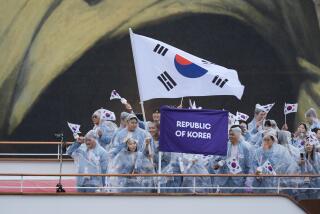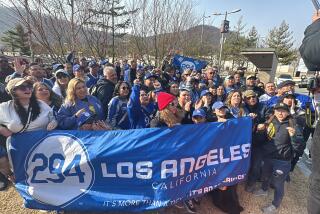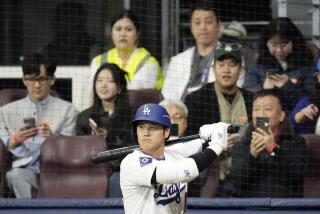ASIA / SPORTS DIPLOMACY : S. Korean Businesses Score Points in Beijing : Seoul hopes that support for the current games will speed economic and diplomatic ties with China.
- Share via
BEIJING — Grab a luggage cart at Beijing airport and it bears an advertisement for Samsung, the giant South Korean conglomerate.
Head downtown and the first billboard to be seen is for Korean Air.
Go to the Beijing Workers Stadium, site of the opening ceremony and many events of the Asian Games, which begin here Saturday, and attached to the scoreboard is an advertisement for Goldstar Co., a big South Korean electronics firm.
Visitors to Beijing these days might easily think China has close ties to capitalist South Korea.
The impression is false. Beijing remains officially aligned with Communist North Korea, which it joined in battle against South Korean and U.N. forces in the 1950-53 Korean War. There are no diplomatic relations between Beijing and Seoul.
But the new South Korean presence does reflect an important geopolitical shift. A flood of South Korean advertising and contributions for the Asian Games is intended to promote Beijing-Seoul ties that could benefit the economies of both nations and contribute to peace on the Korean Peninsula.
“The Korean government and Korean companies are supporting the Asian Games 100%,” commented Willie Park, chief representative for the Korean conglomerate, Daewoo Corp., in Beijing. “We hope the Asian Games will be a turning point for (South) Korea and China. . . . We hope after the Asian Games, we’ll have a (South Korean) trading office in China and (a Chinese trading office) in Korea.”
Park noted, however, that Chinese actions are constrained by concern about alienating North Korea. “If North and South Korea improve their relations, the relations between South Korea and China will be expedited,” he said.
South Korea will send 555 athletes to Beijing, according to Yoon Phil Moon, director of the business department of the Korean Olympic Committee. Chinese officials “are trying to help us and to be friendly . . . ,” he added.
Partly in deference to North Korean sensibilities, South Korean firms are still barred from directly opening offices in Beijing. Park’s office here is registered under the name Kingston International Development (H. K.) Ltd., a Daewoo subsidiary set up in Hong Kong to operate in China.
Such restrictions have not dampened South Korean corporate enthusiasm for using the Asian Games as a wedge to pry open the door to China. Reports from Seoul indicate that South Korean companies have spent $15 million or more on promotional efforts, including advertising and donations of cash and goods to support the games. Park said Daewoo donated 150 cars to the games.
Daewoo, Park said, is looking toward joint ventures in China.
“They have cheap labor and natural resources. We have, not high technology like the United States, but some production capability,” he said. “Combine them, and that will be helpful for China and helpful for Korea.”
Significant trade is already conducted between the two nations, which are each other’s seventh-largest trading partners. Total two-way trade in 1989 was $3.14 billion.
Closer Seoul-Beijing contacts coincide with even faster improvement in Seoul-Moscow ties.
“There’s the collapse of Eastern Europe and the unification of Germany, and the relation of Russia with (South) Korea is very close right now,” Park commented. “That means automatically relations between China and Korea will improve.”
More to Read
Sign up for Essential California
The most important California stories and recommendations in your inbox every morning.
You may occasionally receive promotional content from the Los Angeles Times.













